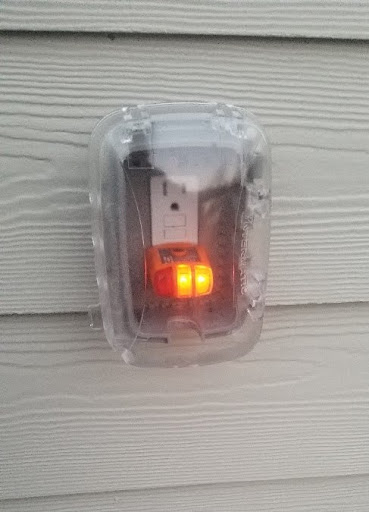When the sun is shining, there’s nothing better than enjoying the great outdoors, especially in the comfort of your own backyard. Whether you’re hosting a family barbecue, lighting up the garden for a nighttime event, or powering tools for a weekend project, the role of outdoor electrical outlets becomes crucial. But with the convenience of accessible power comes the responsibility of safety. This brings us to a common question many homeowners ask: Do all outdoor outlets have to be GFCI?
In this blog, we’ll dive deep into why GFCI outlets are essential for outdoor use, what the National Electrical Code (NEC) says, and how you can make sure your home meets these important safety standards.
What Is a GFCI Outlet, and Why Is It Important?
A Ground Fault Circuit Interrupter (GFCI) outlet is a type of electrical outlet designed to protect people from electric shock. Unlike standard outlets, a GFCI outlet monitors the amount of current flowing from hot to neutral. If there is any imbalance, it trips the circuit and cuts off electricity. This can prevent the severe, and sometimes fatal, shocks that occur when electricity comes into contact with water or a person’s body.
GFCI outlets are easily recognizable by their test and reset buttons, and they are often found in kitchens and bathrooms where the risk of water contact is high. But their use goes far beyond the interior of a house.
Understanding the National Electrical Code (NEC)
According to the National Electrical Code, all the outdoor outlets for residential homes must be equipped with GFCI protection. This requirement is not just a suggestion but a strict code requirement aimed at preventing electrical shock injuries and fatalities.
Why Are GFCI Outlets Required Outdoors?
Now, let’s tackle the main question: do all outdoor outlets have to be GFCI? The short answer is yes. Here’s why this is the case:
1. Safety First
So, why are GFCI outlets required outdoors? The primary reason is safety. Outdoor areas are more exposed to rain, snow, and general moisture than the inside of your home. Water is a great conductor of electricity, and having GFCI protection outdoors significantly reduces the risk of electric shock.
2. Compliance With National Electrical Code (NEC)
The National Electrical Code (NEC) mandates that all outdoor outlets must be GFCI-protected. This code is adopted in many local building codes, which means that to comply with the law and pass electrical inspections, outdoor outlets need to be GFCI.
3. Protection From Indirect Contact
Even if you’re careful, indirect contact with electricity can happen outdoors. For example, touching a piece of equipment that’s plugged into a faulty outlet can lead to a shock. GFCI outlets break the circuit long before this becomes a hazard.
What About Other Areas?
While we’ve established that outside outlets are required to be GFCI, what about other areas? GFCI outlets are also mandatory in:
- Bathrooms
- Kitchens (near the sink)
- Laundry and utility rooms
- Garages and sheds
- Unfinished basements
- Any area near a water source
How to Keep Your Outdoor Outlets Safe
It’s important to be aware that exterior outlets are required to be GFCI-protected so that you can take the necessary precautions. However, there are additional steps you can take to safeguard your outdoor receptacles. Let’s review how to keep these outdoor receptacles safe and secure.
Inspect Your Existing Outlets
Do all your outdoor outlets have the GFCI designation? Look for outlets with “test” and “reset” buttons. These are GFCI outlets. If your outdoor outlets don’t have these buttons, they’re not GFCI-protected and need to be upgraded.
Installation and Upgrades
If you find that your outside outlets are required to be GFCI but aren’t, it’s time to upgrade. A licensed electrician can replace existing outlets with GFCI receptacles. Alternatively, a GFCI breaker can be installed in the breaker box to protect all outlets on the same circuit.
Regular Testing Is Key
GFCI outlets should be tested monthly to confirm they’re functioning correctly. You can do this by pressing the “test” button, which should trip the outlet and cut off the power. Pressing the “reset” button should restore power. If pressing these buttons doesn’t change anything, your outlet needs to be repaired or replaced.
Weather-Resistant GFCI Outlets
For outdoor outlets, the NEC also requires the use of weather-resistant GFCI receptacles. These are specially designed to withstand the elements, providing an extra layer of protection against moisture and temperature changes. They are marked with “WR” to signify weather resistance.
Safety First With ServiceWise Electric
Understanding that GFCI outlets are required outdoors is more than just following a rule — it’s about keeping your home and loved ones safe. Outdoor electrical outlets carry inherent risks, and the protection offered by GFCI technology is indispensable.
If you’re unsure about the status of your outdoor outlets or need to upgrade to GFCI outlets, don’t hesitate to contact ServiceWise Electric. Our expert electricians in Canton, GA, can inspect your home’s electrical system, upgrade outdated outlets, and even offer a recessed lighting installation service to brighten up your home safely and beautifully. We can also provide you with an electrical inspection report to make sure your home is up to code and safe for your family.
Remember, with electricity, it’s always better to be safe than sorry. Schedule your service with ServiceWise Electric and keep your home powered safely and efficiently!









